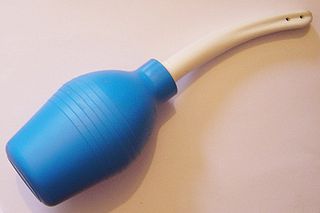Related Research Articles

Safe sex is sexual activity using methods or contraceptive devices to reduce the risk of transmitting or acquiring sexually transmitted infections (STIs), especially HIV. "Safe sex" is also sometimes referred to as safer sex or protected sex to indicate that some safe sex practices do not eliminate STI risks. It is also sometimes used colloquially to describe methods aimed at preventing pregnancy that may or may not also lower STI risks.
Vaginitis, also known as vulvovaginitis, is inflammation of the vagina and vulva. Symptoms may include itching, burning, pain, discharge, and a bad smell. Certain types of vaginitis may result in complications during pregnancy.

Microbicides for sexually transmitted infections are pharmacologic agents and chemical substances that are capable of killing or destroying certain microorganisms that commonly cause sexually transmitted infection.

Personal lubricants are specialized lubricants used during sexual acts, such as intercourse and masturbation, to reduce friction to or between the penis and vagina, anus or other body parts or applied to sex toys to reduce friction or to ease penetration. As of 2015, the personal lubricant market was estimated to be worth at least $400 million.
Dry sex is the sexual practice of having sexual intercourse without vaginal lubrication. Vaginal lubrication can be removed by using herbal aphrodisiacs, household detergents, antiseptics, by wiping out the vagina, or by placing leaves in the vagina besides other methods. Dry sex is associated with increased health risks.
Serosorting, also known as serodiscrimination, is the practice of using HIV status as a decision-making point in choosing sexual behavior. The term is used to describe the behavior of a person who chooses a sexual partner assumed to be of the same HIV serostatus to engage in unprotected sex with them for a reduced risk of acquiring or transmitting HIV/AIDS.

Pre-exposure prophylaxis for HIV prevention, commonly known as PrEP, is a form of medication used to prevent HIV infection, the cause of HIV/AIDS.

A sexually transmitted infection (STI), also referred to as a sexually transmitted disease (STD) and the older term venereal disease (VD), is an infection that is spread by sexual activity, especially vaginal intercourse, anal sex, oral sex, or sometimes manual sex. STIs often do not initially cause symptoms, which results in a risk of transmitting them on to others. The term sexually transmitted infection is generally preferred over sexually transmitted disease or venereal disease, as it includes cases with no symptomatic disease. Symptoms and signs of STIs may include vaginal discharge, penile discharge, ulcers on or around the genitals, and pelvic pain. Some STIs can cause infertility.

A douche is a device used to introduce a stream of water into the body for medical or hygienic reasons, or the stream of water itself. Douche usually refers to vaginal irrigation, the rinsing of the vagina, but it can also refer to the rinsing of any body cavity. A douche bag is a piece of equipment for douching—a bag for holding the fluid used in douching. To avoid transferring intestinal bacteria into the vagina, the same bag must not be used for an enema and a vaginal douche.

iPrEx was a phase III clinical trial to determine whether the antiretroviral medication emtricitabine/tenofovir could safely and effectively prevent HIV acquisition through sex in men who have sex with men and transgender women. iPrEx was the first human study of an HIV prevention strategy known as pre-exposure prophylaxis, or PrEP.
CAPRISA 004 is the name of a clinical trial conducted by CAPRISA. This particular study was the first to show that a topical gel could reduce a person's risk of contracting HIV. The gel used in the study contained a microbicide.

CONRAD is a non-profit scientific research organization that works to improve global and reproductive health, particularly in women in developing countries. CONRAD was established in 1986 under a cooperative agreement between Eastern Virginia Medical School (EVMS) and the United States Agency for International Development (USAID). CONRAD’s products are developed primarily for women in low-resource settings, in that they are designed to be safe, affordable and user-friendly. CONRAD is led by Scientific and Executive Director Gustavo F. Doncel, M.D., Ph.D. Primary funding for CONRAD comes from the U.S. President's Emergency Plan for AIDS Relief (PEPFAR) through the U.S. Agency for International Development (USAID), with additional funding from The Bill & Melinda Gates Foundation and the National Institutes of Health (NIH).
HIV prevention refers to practices that aim to prevent the spread of the human immunodeficiency virus (HIV). HIV prevention practices may be undertaken by individuals to protect their own health and the health of those in their community, or may be instituted by governments and community-based organizations as public health policies.
A rectal microbicide is a microbicide for rectal use. Most commonly such a product would be a topical gel inserted into the anus so that it make act as protection against the contract of a sexually transmitted infection during anal sex.
PRO 2000 is an experimental vaginal microbicide which has been proposed as a preventive medicine for reducing the risk of contracting HIV. It has never been recommended as an effective medicine to be used for any purpose. Some clinical trials have shown that under some conditions it may provide some protection against HIV.
Multipurpose prevention technologies (MPTs) are a class of products designed to address at least two health issues simultaneously, often focusing on sexual and reproductive health which includes contraception, human immunodeficiency virus (HIV) prevention, other sexually transmitted infection (STI) preventions, such as genital infection by human simplex virus (HSV) infection and human papillomavirus (HPV) infection. For example, MPTs can combine contraception and HIV prevention, contraception and other STI prevention, or the prevention of multiple STIs. Since the simultaneous use of multiple products with a single indication against each specific sexual and reproductive health issue is inconvenient, this method may affect adherence. As a result, the goal of developing a MPT as an all-in-one product is to combat this issue.
Elizabeth Anne Bukusi FAAS is a research professor working within the field of obstetrics and gynaecology, and global health. Bukusi's main areas of research focus around sexually transmitted infections, women's health, reproductive health, and HIV care, prevention and treatment. Bukusi is the Chief Research Officer at the Kenya Medical Research Institute (KEMRI) and led a "landmark" study on the use of PrEP in Kenya.

Dapivirine (DPV) Ring is an antiretroviral vaginal ring pioneered by the International Partnership for Microbicides (IPM) pending for regulatory review. It is designed as a long-acting form of HIV prevention for at-risk women, particularly in developing nations such as sub-Saharan Africa. IPM has rights to both the medication and the medical device. A total of four rings with different drug diffusion systems and polymer composition have been developed by IPM. The latest design, Ring-004, is a silicone polymer matrix-type system capable of delivering DPV intravaginally in a sustained manner.
Kimberly A. Powers is an American epidemiologist who is an associate professor of epidemiology at the UNC Gillings School of Global Public Health. She combines epidemiology, statistics and mathematical modelling to understand the transmission of infectious diseases. In 2011 her work on antiretroviral therapy for the management of human immunodeficiency virus was selected by Science as the breakthrough of the year. During the COVID-19 pandemic, Powers looked to understand the spread of SARS-CoV-2.
Sharon Louise Hillier is an American microbiologist. She is the Richard Sweet Endowed Chair in Reproductive Infectious Disease and vice chair of the department of obstetrics, gynecology and reproductive sciences at the University of Pittsburgh Medical Center (UPMC) and Magee-Women's Research Institute.
References
- 1 2 3 4 5 6 Weber, J.; Desai, K.; Darbyshire, J.; Microbicides Development Programme (2005). "The Development of Vaginal Microbicides for the Prevention of HIV Transmission". PLOS Medicine. 2 (5): e142. doi: 10.1371/journal.pmed.0020142 . PMC 1140953 . PMID 15916473.
- 1 2 Darroch, Jacqueline E.; Jennifer J. Frost (January–February 1998). "Women's Interest in Vaginal Microbicides". Family Planning Perspectives. 31 (1): 16–23. doi:10.2307/2991552. JSTOR 2991552. PMID 10029928 . Retrieved 21 November 2011.
- 1 2 Laurence, Jeffery; Johnston, Rowena (19 February 2009). "The Promise of an Effective Vaginal Microbicide". amfar.org. Archived from the original on 23 March 2011. Retrieved 20 November 2011.
- 1 2 Stone, Alan B.; Harrison, Polly F.; Lusti-Narasimhan, Manjula (2013-09-10). "Microbicides from a regulatory perspective". AIDS. 27 (14): 2261–2269. doi: 10.1097/QAD.0b013e32836239b4 . ISSN 0269-9370. PMID 23612007.
- ↑ Montgomery, Elizabeth T.; Roberts, Sarah T.; Nel, Annalene; Malherbe, Mariette; Torjesen, Kristine; Bunge, Katherine; Singh, Devika; Baeten, Jared M.; Marrazzo, Jeanne; Chirenje, Z. Mike; Kabwigu, Samuel; Beigi, Richard; Riddler, Sharon A.; Gaffour, Zakir; Reddy, Krishnaveni (2019-11-15). "Social harms in female-initiated HIV prevention method research: state of the evidence". AIDS. 33 (14): 2237–2244. doi: 10.1097/QAD.0000000000002346 . ISSN 0269-9370. PMC 6832829 . PMID 31408030.
- ↑ Mauck, Christine K.; Schwartz, Jill L. (2012). "Dyeing to Know: The Use of Vaginal Applicator Staining and Other Techniques to Assess Adherence to Product Use in Microbicide Trials". Sexually Transmitted Diseases. 39 (9): 713–715. doi:10.1097/OLQ.0b013e318264f6b0. ISSN 0148-5717. JSTOR 44981930. PMID 22902668.